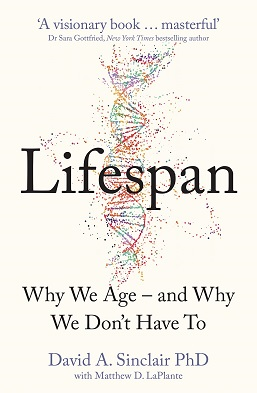Lifespan: Why We Age—and Why We Don't Have To (Book Description)
In the realm of aging research, few books have generated as much interest and excitement as Dr. David Sinclair's groundbreaking work, "Lifespan: Why We Age—and Why We Don't Have To." Published to critical acclaim, this thought-provoking book challenges our fundamental understanding of aging and offers a revolutionary perspective on human longevity.

Image sourced from Wikipedia
Who is David Sinclair?
Dr. David Sinclair is a professor in the Department of Genetics at Harvard Medical School and co-director of the Paul F. Glenn Center for the Biological Mechanisms of Aging. With laboratories in both Boston and Sydney, Sinclair has established himself as one of the world's foremost authorities on aging research. His work has been published in prestigious scientific journals like Nature, Cell, and Science, making him a leading voice in the scientific community's effort to understand—and potentially overcome—the aging process.
Beyond his academic credentials, Sinclair's personal connection to aging research is deeply rooted in his own experiences. In the book, he shares touching stories about his grandmother Vera, whose vibrant spirit in youth contrasted sharply with her frailty in old age, inspiring his lifelong mission to understand why we age and how we might extend human healthspan.
The Information Theory of Aging
At the heart of "Lifespan" is Sinclair's revolutionary "Information Theory of Aging." This theory posits that aging is fundamentally a loss of information—not in our genes themselves, but in how those genes are regulated and expressed. Sinclair makes a crucial distinction between two types of information in our bodies:
- Digital information - Our DNA, which remains largely intact throughout our lives
- Analog information - Our epigenome, which controls which genes are turned on or off
According to Sinclair, aging occurs primarily because of the degradation of analog information. While our genetic code (digital information) remains largely unchanged as we age, the epigenetic markers that tell our cells which genes to express become increasingly disordered over time.
He explains this concept using a brilliant metaphor: if our genome is like a piano with each gene representing a key, then the epigenome is the pianist. As we age, the pianist (epigenome) becomes increasingly distracted and disoriented, hitting wrong notes and playing discordantly, even though the piano (genome) remains perfectly intact.
The Survival Circuit and Sirtuins
Sinclair traces the origin of aging back to what he calls the "survival circuit," an ancient genetic pathway that evolved billions of years ago in the earliest forms of life. This circuit includes genes called sirtuins, which Sinclair describes as "longevity genes" that regulate cellular health and repair.
Sirtuins serve as guardians of the cell, directing resources toward repair and maintenance during times of stress. However, when repeatedly called away from their normal duties to address DNA damage, sirtuins can lose track of their original positions, creating epigenetic "noise" that manifests as aging.
In the book, Sinclair recounts his early research with yeast cells, where he discovered that activating a sirtuin gene called SIR2 could extend the lifespan of these simple organisms by about 30 percent. This finding, along with subsequent research, suggested that sirtuins play a crucial role in regulating longevity across species—from yeast to humans.
Can We Reverse Aging?
Perhaps the most provocative aspect of "Lifespan" is Sinclair's assertion that aging is not inevitable. If aging is primarily caused by epigenetic changes rather than genetic damage, then theoretically, it could be reversed by restoring proper epigenetic patterns.
Sinclair shares evidence from his laboratory where researchers created "ICE mice" (Inducible Changes to the Epigenome) that experienced accelerated aging when their DNA was intentionally damaged in non-coding regions. The damage distracted sirtuins from their normal duties, creating epigenetic chaos that manifested as premature aging.
More encouragingly, Sinclair describes interventions that might activate sirtuins and potentially slow or reverse aspects of aging:
- Caloric restriction - Reducing calorie intake without malnutrition has been shown to activate sirtuins and extend lifespan in multiple species
- Intermittent fasting - Periodically abstaining from food can stimulate cellular repair mechanisms
- Exercise - Physical activity creates beneficial stress that activates longevity pathways
- Exposure to heat and cold - Mild temperature stress can trigger hormetic responses that strengthen cellular resilience
- NAD+ boosters - Supplements that increase levels of nicotinamide adenine dinucleotide (NAD+), a molecule necessary for sirtuin function
The Future of Aging Research
Throughout "Lifespan," Sinclair maintains a cautiously optimistic tone about humanity's prospects for extending healthy lifespans. He envisions a future where aging is treated as a medical condition rather than an inevitable biological process—a paradigm shift that could transform healthcare and society.
The book concludes with thoughtful reflections on the potential social, economic, and ethical implications of substantially extended human lifespans. Rather than viewing longevity as a burden on society, Sinclair argues that longer, healthier lives could enhance human productivity, creativity, and happiness.
Why "Lifespan" Matters
"Lifespan" is not merely a scientific treatise; it's a compelling invitation to reimagine our relationship with aging. By presenting cutting-edge research in accessible language, Sinclair challenges readers to consider that what we've long accepted as inevitable—the physical and cognitive decline that accompanies old age—might actually be preventable.
Whether or not Sinclair's optimistic vision of human longevity comes to fruition, "Lifespan" offers valuable insights into how we might live healthier lives today. The book has inspired countless readers to make lifestyle changes that activate their own longevity pathways, potentially extending not just their lifespans but, more importantly, their healthspans—the portion of life spent in good health.
For anyone interested in the science of aging, optimizing health, or contemplating humanity's future, "Lifespan" provides a fascinating and thought-provoking journey into one of biology's final frontiers. As Sinclair himself might say, the clock is ticking—but perhaps we have more control over that clock than we ever imagined.
https://aging-bio.com/search_index.en.json$MATCHES more matches